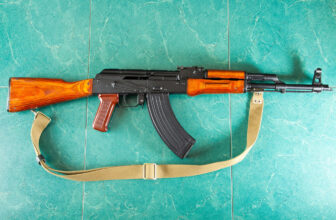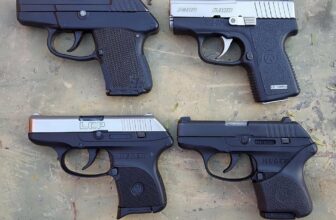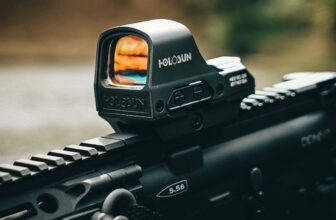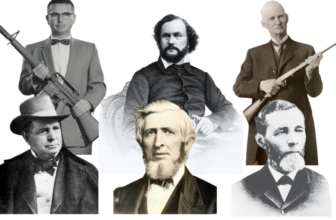There is one part of the pistol cartridge that is overlooked but plays an essential role: primers. They profoundly impact your cartridge performance, but many people do not know what they do.
Often when there is an ammo shortage, there is also a primer shortage. They are an essential part of your gun for various reasons, and the exciting news is that their technology is becoming more advanced and high-quality.
But where do you begin with buying pistol primers? There are many different types of primers, so if you want to invest in a pistol primer, it is essential you know your pistol primer options.
Here is the ultimate guide to gun primers, so you can stay on target and make an informed choice that meets your needs.
What Is a Pistol Primer?
Gun primers hold a small amount of explosives to ignite the fuel in a cartridge. This small charge allows the gunpowder to light and sends the bullet out of the gun.
Gun primers are part of the charge or cartridge of your gun. A metal cap secures their explosive. The explosive mix usually consists of barium nitrate, antimony sulfide, tetrazene, styphnate, and lead.
How Pistol Primers Work
A domino effect occurs in your pistol when you activate the trigger. The pin strikes the primer cap, which then starts the primer. The primer then explodes as hot steam comes out via the flash hole into the cartridge case, causing the ‘bang’ sound.
Types of Primers
There are different types of primers, including pistol primers. Several factors distinguish each primer:
- The type of weapon you are using
- If they are for magnum or standard ammunition
- Their design
- If they are used for rimfire or centerfire ammunition
You can get both rifle primers and pistol primers. Rimfire primers are built into the casing, whereas you change centerfire primers during the reloading process. You cannot replace rimfire primers without expensive equipment, which is why many reload opt for centerfire primers.
Standard primers are for cartridges with modern capacities and speed. Magnum primers are usually for magnum cartridges, but there are sometimes cases when they are used with spherical gunpowder, as magnum primers burn hotter, which helps this gunpowder ignite. Some large charges of slow-burning power need magnum primers, especially in cold weather.
There are also different designs of primers, with most ammunition from the US using Boxer primers. Boxer primers can have fewer sizes, which simplifies processes such as reloading, and there is no risk of wearing out the anvil. The other main type is Barden primers, which you might want to consider if you do not have a US calibre.
Pistol Primer Sizes
Pistol primers come in small and large sizes. Usually, small primers are around 0.175 inches in diameter, whereas large ones are 0.210 inches. Primer caps also come in different sizes for variations in firing.
Pistol primers are usually thinner, and their primer cups are softer than rifle primers. Small pistol primers are typically used for consistency and accuracy. Large pistol primers often have stronger ignitions, which can make them have more velocity.
Usually, the size primer you need is determined by the caliber of the ammunition. You cannot interchange rifle primers and pistol primers. If you are unsure what size best suits your pistol, you can contact the primer provider or your gun’s manufacturer directly.
Pistol Primer Considerations
Do you want to find the best pistol primer? When you are looking at your pistol primer options, there are several factors you should consider. These factors include:
- The primer sizing
- The type
- The provider
- Safety and storage
- Costs
- Quality
Some reloading manufacturers specifically state that you should not use a specific brand primer in loads. It is because there can be issues with your gun igniting all types of primers. Never assume the primer is correct for you just by its name; you need to read packaging details and reach out for support if you have any questions.
You can also reduce risks with your pistol primers by picking a reliable provider of primers. A reputable provider will have the knowledge, experience, and customer service to ensure you make an informed purchase. You are also more likely to find quality primers this way.
You will also need to consider pistol primer costs and check what is within your budget. Do not sacrifice quality or safety for a cheaper deal. It is best to check independent reviews for providers and primers to ensure you are using a reputable company.
Commit to proper storage of your gun primer. Ammunition should be in a cold and dry place because weather conditions can impact your primer. For example, moisture and humidity can damage gun primers, which increases the risks of negligent discharges and other severe consequences.
Stay Safe Using a Gun Primer
When you narrow down your pistol primer options, you can also consider some safety tips to help you prepare for using gun primers. One of the most important safety tips is to use one type of gun primer at a time, especially when you begin. Otherwise, you could risk mix-ups, which can cause various issues.
You should also wear eye protection when reloading, especially using primers. Primers could ignite during the reloading process, so wear the right gear to protect yourself.
And always ensure the primer is appropriately in its casing; otherwise, there is a risk of misfire. When purchasing primers, check if there are instruction manuals or a way to contact customer service if you need assistance.
The Best Pistol Primers
Learning about different parts of your gun is vital to connect with it and understand how to utilize it best. If you own a pistol, you can begin to understand pistol primers with this guide. As there are a variety of pistol primers out there, be sure to pick a reputable provider for the best experience.
Are you ready to invest in gun primers? Target Sports USA is here to help with a range of products to meet your needs. Contact us today if you have any questions.






